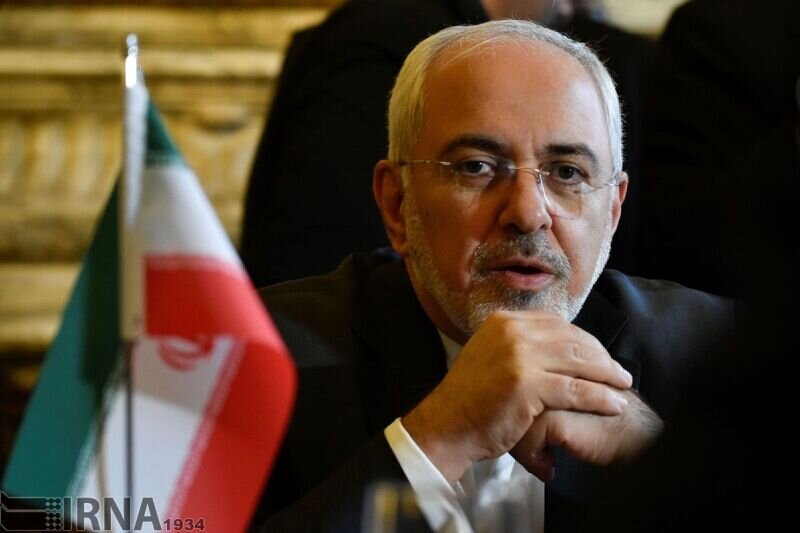Zarif says U.S. values Arab oil more than Arab blood

TEHRAN – Iranian Foreign Minister Mohammad Javad Zarif said on Thursday that the United States values oil more than the lives of the Arab people, criticizing Washington’s hypocrisy regarding the war on Yemen.
“Arab blood vs. Arab oil / A primer on U.S. policy: 4 yrs of indiscriminate bombardment of Yemen, 100,000 dead Yemenis, 20M malnourished Yemenis, 2.3M cholera cases, carte (blanche) for culprits,” he tweeted.
He added that however the “retaliatory Yemeni strike on oil storage tanks” was labeled by the Americans as an “unacceptable act of war”.
In a tweet on Tuesday, Zarif said, “Just imagine: The U.S. isn’t upset when its allies mercilessly BOMB babies in Yemen for over 4 years—with its arms and its military assistance.
But it is terribly upset when the victims react the only way they can—against the aggressor’s OIL refineries.”
Yemenis hit two oil facilities in Saudi Arabia on Saturday.
Washington has claimed that Iran was involved in the attacks, an accusation Iran has called “maximum deceit”.
Iran has officially presented a letter to the Swiss embassy in Tehran strongly warning U.S. officials against their claims that Iran had a role in the attacks on the Saudi Aramco oil facilities.
The letter was submitted to the Swiss ambassador to Tehran whose country represents the U.S. interests in Iran.
In the letter, which was presented on Monday afternoon, Iran has insisted that it was not involved in the attack on the Saudi oil installations and that claims by U.S. Secretary of States Mike Pompeo and President Donald Trump are sheer lies and condemned them.
President Hassan Rouhani said on Wednesday, “Enemies of the region should learn from the Yemenis’ response and put out fire in the region.”
“Instead of leveling accusations, believe the (Yemeni) people’s power. It is not the governments. It is the people who have risen,” he said during a cabinet meeting.
“It was not the Yemenis who started the war. Saudi Arabia, the United States, the United Arab Emirates, the Zionist regime of Israel and certain European countries started the war and destroyed Yemen,” he lamented.
Zarif suggested on Tuesday that ending the war in Yemen is the “only solution for all”, criticizing the United States for denying the fact that Yemenis would strike back against “worst war crimes” committed by Saudi Arabia with a Washington’s support.
“The U.S. is in denial if it thinks that Yemeni victims of 4.5 years of the worst war crimes wouldn’t do all to strike back.
Perhaps it’s embarrassed that $100s of blns of its arms didn’t intercept Yemeni fire.
But blaming Iran won’t change that.
Ending the war=only solution for all,” he tweeted.
In another tweet on Sunday, Zarif said Iran’s four-point plan put forward in April 2015 is the remedy for the current situation.
“Blaming Iran won’t end disaster. Accepting our April 15 proposal to end war and begin talks may,” Zarif pointed out.
On April 15, 2015, Zarif submitted a letter to Ban Ki-moon, then UN secretary general, outlining Iran’s four-point peace plan for Yemen.
The plan calls for an immediate ceasefire and end of all foreign military attacks, humanitarian assistance, a resumption of broad national dialogue and establishment of an inclusive national unity government.
Saudi Arabia launched military campaign against Yemen in March 2015 with the aim of eliminating the Yemeni opposition groups who had toppled the government of President Mansour Hadi.
Failing to achieve either of its goals, Riyadh has not stopped bombing Yemeni targets, creating a protracted conflict which has led to indescribable tragedies in the country.
On March 25, 2019, on the fourth anniversary of the Saudi-led war on Yemen, the United Nations released a report saying the war has caused "the world's worst humanitarian crisis”.
It said about 24 million Yemenis -- about 80 percent of the population -- are in need of humanitarian assistance. The UN said millions more have been displaced by the fighting in Yemen.
UN officials also said the conflict has led to many civilian deaths and created food shortages. They also say it is destroying the health and education of an entire generation of Yemeni children.
NA/PA
